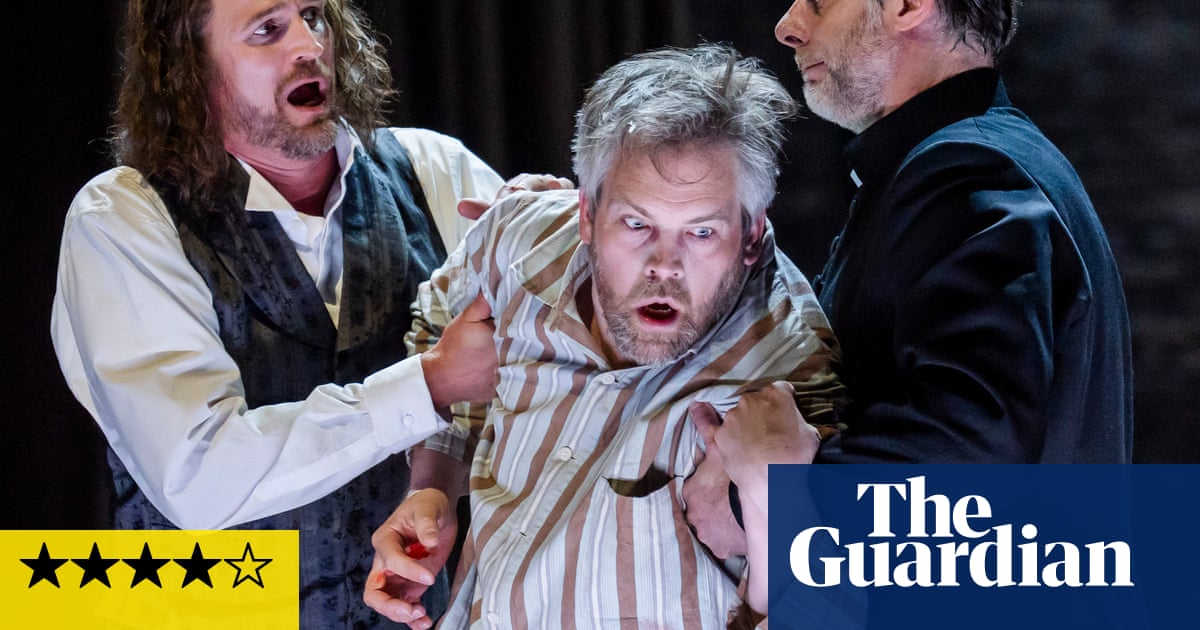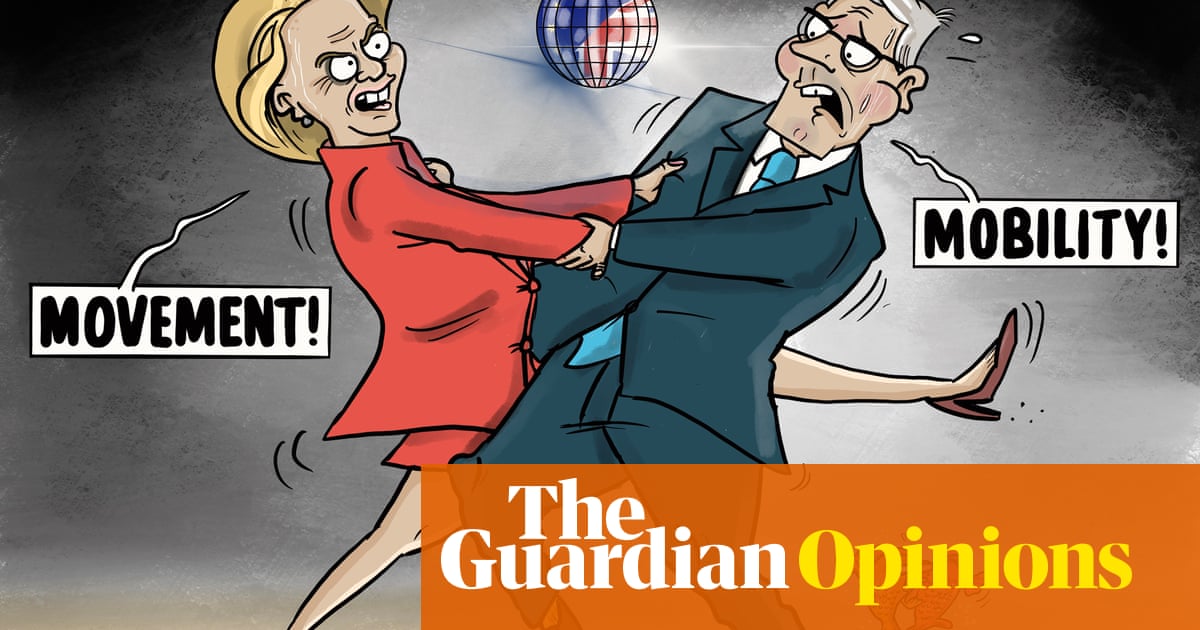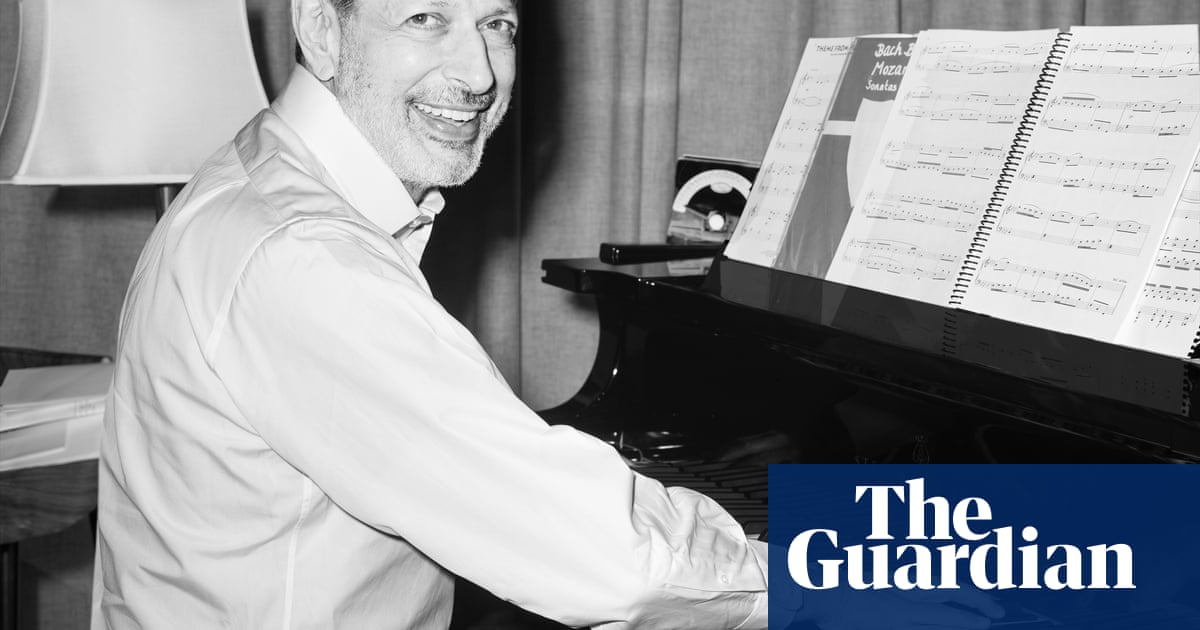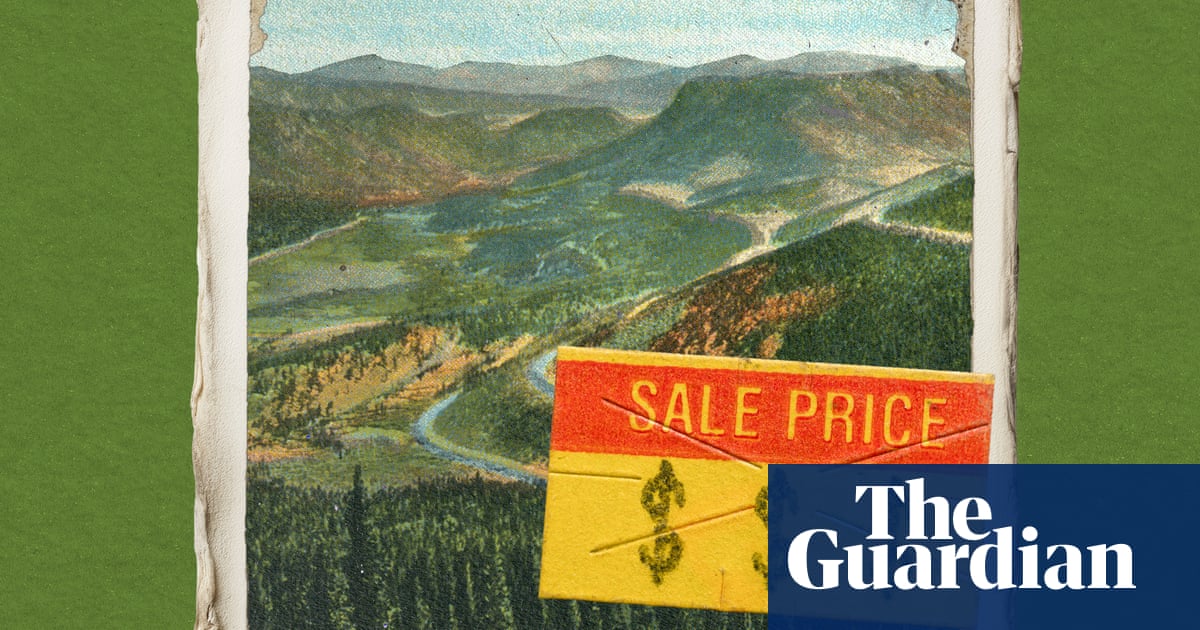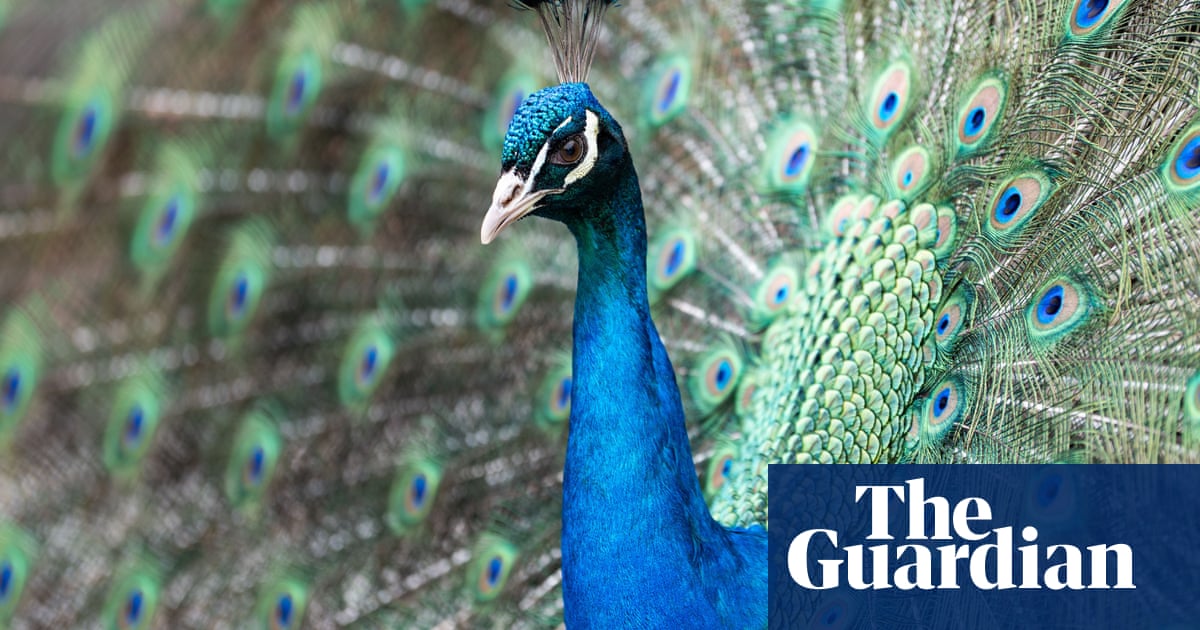Steve Kell, 59, countryside ranger, Warwickshire Country Parks
I always loved being in nature. But I didn’t know what I wanted to do when I was 18, so I got a job at a high-street bank. My grandfather was made up – he was convinced I was going to be the governor of the Bank of England. But over the years I became disenchanted. Then, in my early 30s, I was diagnosed with testicular cancer and had to take months off work. I couldn’t help thinking about how finite life is. I decided I wanted to do something I really enjoyed.
My partner, Rachael – now my wife – supported me going back to college full-time for two years, so I could get a national diploma in countryside management. I did a placement where I work now, in Kingsbury Water Park, a site of more than 240 hectares (600 acres) owned by Warwickshire council. Two days after my placement ended, a ranger resigned and I was hired to do some of their work. I’ve now been a countryside ranger for 20 years.
If I’m on an early shift, my work starts at 7.15am. I’ll open the park and do a site check – I usually walk between two and four miles every day. Sometimes I’ll see muntjac deer on my rounds. When the school groups turn up, I’ll go into the woodlands or a field and do pond-dipping or minibeasting to teach the children about the insects that live in those habitats.
Our site is quite close to central Birmingham, and I get such a buzz from showing people the countryside and encouraging them to appreciate their local green spaces. I love seeing the sheer delight of the children when they discover the wildlife here, and passing on my knowledge to them.
I don’t care whether it’s raining, snowing or sunny: I feel a massive amount of freedom just being outside, breathing fresh air, instead of being stuck inside an air-conditioned office. On a physical level, I do get tired – but I’m a lot fitter than I would be if I worked indoors at my age and I don’t feel the stresses I did in my previous job. Instead I feel happier and more fulfilled. Although I’ve only recently surpassed the salary I used to earn in banking, my job pays the bills and that’s all I want financially. Rachael, who earns more than me and works in an office, is fully supportive. She’s glad I made the switch to working outdoors because of the benefits to my health and wellbeing. We’ve always been comfortable, financially, while raising our son, who is now 18: my career choice has not affected our lifestyle choices.
Rather than making profit for a company, I’m improving the world we live in and passing on my love of the outdoors to others. Walking around this park, with the wind on my face, surrounded by wildlife, I feel peace of mind – and joy.
‘The day after I watched that sunset, I resigned’
Angela Musk, 31, community outreach officer, Ramblers Scotland
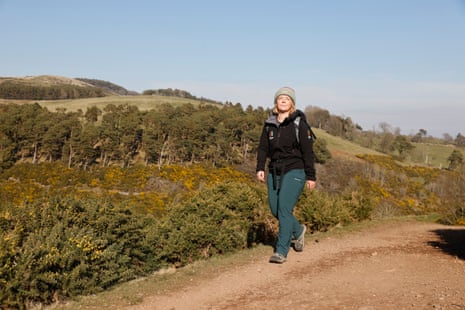
I can vividly remember the moment I decided to leave my job as a prison officer. It was two years ago and I was out walking my dog near home in South Queensferry, a village west of Edinburgh. Standing at the top of a field, watching the sunset over the Pentland Hills, I realised that when I’m outdoors, my thoughts are free. I have space to breathe, I feel at peace.
I’d been considering leaving the Prison Service for a long time. I was struggling with arriving at and leaving work in the dark in winter – many windows are misted up for security reasons, and I spent most of the day indoors. Prisons can be tough places to work. I didn’t feel able to contribute what I wanted to.
After university, I’d had an internship as an outdoor instructor and was working toward my mountain leader qualifications. I loved it. But as a woman, I’d questioned whether I belonged outdoors, leading people up mountains. I’d felt pressure to get a secure job with a clear career progression.
The day after I watched that sunset, I resigned. That same day, I saw Ramblers Scotland was hiring a community outreach officer. The role involves working with refugees, asylum seekers and people from global majority communities to create walking programmes and teach outdoor skills and navigation, so that everyone feels comfortable going out walking by themselves in Scotland.
I felt so lucky the day I got the job. Without needing to take a pay cut, I get to work outdoors for a living and turn the right to roam the Scottish countryside into a reality for everyone. I use the skills I learned in the Prison Service, about how to approach people from all types of backgrounds, and I support them to get outdoors in Scotland, often for the first time. Recently, I’ve been developing a new programme to teach women from diverse backgrounds to lead within their own communities.
A typical summer’s day begins with me packing a rucksack with everything I need as a group leader – emergency shelter, first aid kit, spare waterproofs and sugary snacks. Then I’ll head to the setting-off point to meet the people I’m leading that day. Often, on the walk they’ll teach me about the plants, trees or mountains in their homeland. Away from the pressures of their daily lives, they express so much enthusiasm and curiosity about nature – and support for each other.
Many refugees I work with fear being where they’re not allowed to be. It can be hard for them to feel as if they belong. But I have learned that the outdoors is a space for everybody. I come home feeling energised, not only because I have connected to nature, but because out there, in nature, I have connected to other people. And it feels amazing.
‘It was like I woke up’
Michelle Burton, 59, former therapeutic coordinator, Jamie’s Farm, Monmouth
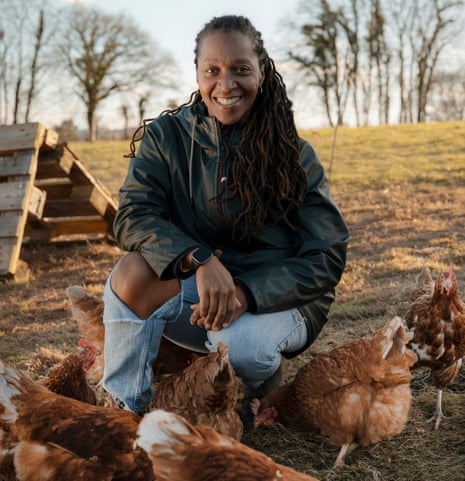
I first came to the farm for a week as part of a course I was helping to facilitate for young unemployed people. I had previously been a family worker in Luton, helping to engage parents in their children’s learning, then I was a coordinator for family workers. The idea here was that the young people would have a week away on the farm, where they would learn new skills, and I would provide pastoral support.
When I first arrived, I was petrified of animals and fearful of bugs. I’d worked indoors ever since I’d got my first job 37 years earlier, at 16. I didn’t like getting mucky and the idea of working outdoors, on a farm, had never crossed my mind. But I really enjoyed myself and I saw the transformation in the young people that week. I thought: there’s something freeing about being in nature. It calms and encourages people to work and support each other. I saw the change in those young people – and that changed me.
We ran the course again, and this time I was more confident with the animals. I realised I liked the values of the staff and the positive way the young people were viewed, praised and given a voice.
The third time I went, it all sat so well with me that I decided I wanted to work there. Instead of feeling scared when I worked with animals, I felt renewed. I remember moving some sheep with a young person, looking down at a beautiful view of the Wye valley and thinking: this is the place for you; this is what you must do with your life. It was like I woke up.
Back in Luton, I felt such a longing to be in the countryside that my daughter bought me two hens. I asked the Jamie’s Farm team to let me know if a job came up and when it did, a year later, I got it. I was 55.
Until I retired earlier this year, I worked as a therapeutic coordinator for children who came to the farm for residential stays. While they carried out jobs in groups, from working with animals to gardening and farm maintenance, I would talk to an individual child while we walked, fed the lambs or planted hedgerows. We would chat about their highlights and how they were feeling, or sometimes we’d just sit together and listen to the birds. In the evenings, we’d play games or sit round a fire, looking at the stars.
after newsletter promotion
I have been rejuvenated by my time on the farm. I used to feel afraid of so many different aspects of the outdoors, but I stepped up and that has given me courage in other areas of my life. It’s made me feel empowered. Physically, mentally and emotionally, I feel fitter and stronger. Working in nature has been very grounding for me and, as the only Black person on the farm, I gave my colleagues insights about how best to support some of the young people we worked with. I saw the impact I was having and found that very inspiring. I feel I’ve left a positive legacy.
‘I love the fact that no day is the same’
Jay Rathod, 31, park officer, St James’s Park, London
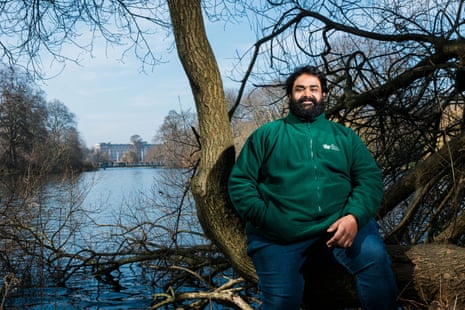
I was sitting on a beach on holiday the day I decided I wanted to work outside. For the previous seven years, I’d worked for a mobile phone company. After the pandemic shut down the store I managed, I began working in merchandising, remotely. I felt stuck at home, in meetings and behind screens all day, working out how to sell phones that would eventually get thrown away. I felt isolated and my achievements didn’t feel meaningful. I also wanted to reduce my carbon footprint and give back to the environment. I wanted to plant something that would outgrow me.
So I quit my office job to do a two-year paid apprenticeship in horticulture and landscaping. That’s quite an unusual decision for someone from my ethnic background and when I told my mother, she warned me my hands would get dirty. I asked what was wrong with that, given my ancestors were farmers. She was worried I’d earn less and get wet, burnt or injured.
The apprenticeship did initially mean a drop in salary, but I was so passionate about it that I finished my course early and applied for my current job at St James’s Park while I was still doing my final assessment. Now, I earn the same as I did before.
I love the fact that no day is the same. Primarily, I carry out general landscape maintenance of the park and its irrigation system, look out for any criminal damage and make sure the site is safe for the public. But I also liaise with the police, cafe owners and contractors, and support the conservators who restore historic monuments, the head gardener and the wildlife officer – a recent highlight was feeding the pelicans. I work with the army and the palace on prestigious events such as trooping the colour and the changing of the guard – which makes my mother very happy – and I assist the volunteer gardeners.
I average 17,000 to 20,000 steps a day, compared with 3,000 when I worked at home. So I’m fitter and healthier – and happier, too, because I know I’m giving back to nature and people benefit from what I do. I love seeing visitors taking photographs of the flowers in bloom or spotting a bird on a tree I planted and knowing I helped make this happen. Physically, I feel exhausted at the end of the day. But mentally and emotionally, I feel stimulated and satisfied, and it’s easier to relax; I’m not anxious and I sleep better.
People complain about working in all weathers, but in the rain I just wear a coat, and if it’s cold I wear more layers. There’s nothing I miss about working indoors.
‘I’ve never not enjoyed a day in this job’
Mandy Abbott, 60, head of falconry, Swinton Estate, North Yorkshire
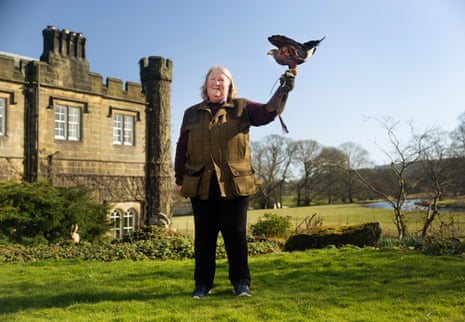
Before the pandemic, I’d spent 30 years cooking in the kitchens of the Swinton Estate, the ancestral seat of the Earl of Swinton, 12 hours a day, four or five days a week. At times, like any kitchen, it could be stressful and with no windows, it could get hot and stuffy.
During lockdown, I started thinking about working outdoors. My daughter – who had got interested in birds when she was 11 – had, at 18, set up a birds of prey centre on the 8,000-hectare (20,000-acre) estate. After working at a local falconry centre and getting a qualification in zoo management, she’d approached the earl and asked if she could set up her own centre in the grounds. The estate takes a commission on bookings, but it’s her business. In my spare time she trained me, so I could help if she was short-staffed.
When Covid hit, I realised I didn’t really have a life. I was always working. Living on a privately owned estate, I had vast grounds to enjoy during lockdown. The birds of prey centre was closed, but I carried on flying the birds to help my daughter out. Otherwise, without their routine, they would have rewilded themselves. Watching them enjoying their freedom made me forget about the scary time we were living in. When they are flying, I feel they are so wild – yet they come to me willingly because I’ve trained them. It’s such a good feeling, this bond I have with them.
When lockdown ended, I became head of falconry at the centre. My daughter is my boss, which should be quite difficult, but has worked out fine. Every day, I’ll check on the birds for signs of illness, clean out their aviaries and get the equipment ready. But my main job is to help other people experience the bond I now have with the birds. We’ve got a kestrel, a falcon, an eagle and many different varieties of owls. Quite a few old ladies who visit have loved owls all their lives – when owls fly to their hands, they break down in tears. Sometimes, children tell me it’s the most exciting thing they’ve ever done. I know I’m giving people an experience they will never forget.
I don’t think I’ve ever not enjoyed a day at work since I took this job. I don’t earn as much as I used to, but I’m home for my family more and we manage. Physically, I’m probably more tired, but I sleep really well and never lie awake worrying about work.
I would never have dreamed of doing this job if it hadn’t been for my daughter. I have her to thank for showing me what I am capable of – and how much I love working outdoors

 4 hours ago
4
4 hours ago
4





